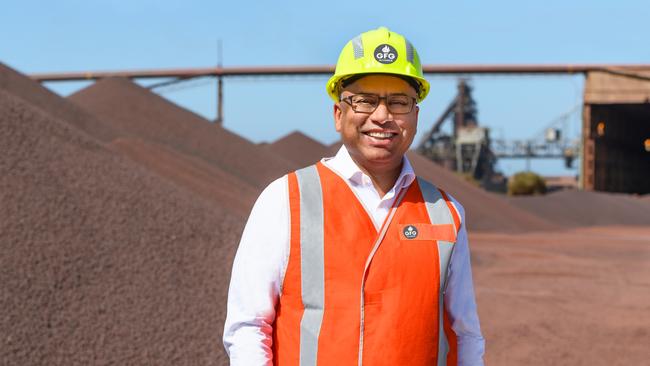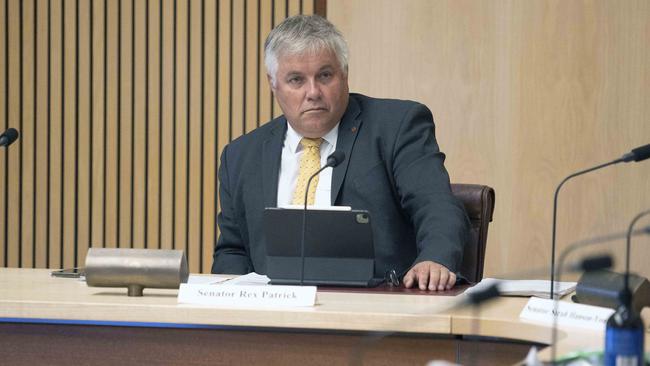‘Taxpayers shouldn’t bail out Gupta’s GFG’
Sanjeev Gupta’s empire - including the Whyalla steelworks - should be left to fall into administration if it can’t pay its bills, says crossbench senator Rex Patrick.

Taxpayer money should not be used to prop up Greensill’s biggest debtor, Sanjeev Gupta’s GFG Alliance, and the British businessman’s string of companies - including the Whyalla steelworks - should be left to fall into administration if it can’t pay its bills, according to key crossbench senator Rex Patrick.
Greensill dived into administration after Mr Gupta withheld payments worth $US5bn to the financier, triggering credit rating downgrade at his most profitable asset, Infrabuild.
Meanwhile, major lenders to Mr Gupta’s conglomerate - as revealed by The Australian - have sought meetings with the industrialist to discover whether his exposure to Greensill Capital sparked a material adverse change clause on their own loans, heaping further pressure as he seeks to refinance at least $US5bn ($6.5bn) in Greensill debt.
Payment of his debt holds the key to returning Greensill creditors some of what they owed, with claims totalling almost $5bn at its Australian operations. Greensill Australia is also claiming almost $800m from the company’s British arm.
It comes as Japanese insurance giant Tokio Marine took the rare step on Tuesday of commenting on one of its clients: Greensill, declaring that the financier’s insolvency “does not crystallise any exposure” to the insurer.
“We would like to clarify that trade credit insurance does not cover the liability of the policyholder nor the insured; rather it covers the accounts receivable of the insured. Hence if Greensill were the insured, trade credit insurance would cover what Greensill is owed, rather than what Greensill owes others,” Tokio Marine said in a statement.
A fortnight ago, it was believed that an agreement was imminent between Mr Gupta and Greensill, with Grant Thornton - the firm charged with Greensill’s administration - was hopeful of striking a resolution quickly.
Ray Horsburgh, a member of GFG’s global advisory board, told The Australian discussions over a standstill agreement were still ongoing.
But it’s understood talks have slowed, fuelling fears about the financial health of Mr Gupta’s empire.

Senator Patrick, who visited Whyalla at the weekend, told The Australian that he feared for the fate of GFG, which bought the steelworks in 2017 after Arrium fell into administration.
He said Mr Gupta withholding $US5bn to Greensill, added to “reconfirms the uncomfortable feeling I have inside” that Mr Gupta “won’t pull through this”.
“There are lots and lots of complications. I’m just not confident that he will have the ability that he will pull through this. It’s for that reason that I went to Whyalla on the weekend to talk to locals about what needs to be considered in the event where a supplier who simply says something like “I’m not going to provide you with these components to fix the coke ovens until such time that I am paid upfront”.
“The situation at Whyalla is you cannot shut the coke ovens down, you cannot shut the blast furnaces down or they will never reopen.”
But Senator Patrick, who has argued that Whyalla should not be able to fail again given its importance to national security and resilience, stressed that taxpayers should not underwrite Mr Gupta’s operations, giving the cloud hanging over his empire’s finances.
“Do I think the Commonwealth should weigh in with their own money right now? Not at all. The only circumstances which the Commonwealth ought to intervene from a financial perspective was if we were facing a situation where there was a threat that either the coke ovens or blast furnaces would fail if Commonwealth action didn’t take place.
“You cannot inject taxpayers money into that organisation given the uncertainty that surrounds it. A better option might be to let the facility fall into administration and then the Commonwealth take a much more active role.
“It might be a case that if the facility is operating in the black as it’s reported to be, Commonwealth assistance might not be required. It might be the Commonwealth throw in a sweetener such as these longer term rail contracts. Or it could be an equity stake - but all of that is dependent on what happens.
Mr Gupta owes up to $2bn to lenders and bondholders globally on top of funds owed to Greensill, according to sources, underlining the scale of debt incurred as he pursued manufacturing deals across a string of locations.
Several of the lenders have sought talks with Mr Gupta’s GFG Alliance, with a number of financing agreements incorporating either cross default or material adverse change clauses which if invoked can entitle the lender to recall part of their loan.



To join the conversation, please log in. Don't have an account? Register
Join the conversation, you are commenting as Logout